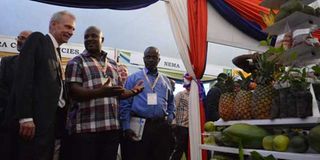Governors yet to implement resolutions of past forums

Kenya Crops and Dairy Market Systems (KCDMS) western region manager Seth Yake (centre) explains the different types of fruits to US ambassador Robert Godec during the devolution conference in Kakamega on April 24, 2018. KCDMS is funded by USAid. PHOTO | ONDARI OGEGA | NATION MEDIA GROUP
What you need to know:
Counties are also on the spot for failure to implement their Integrated Development Plans.
One of the key resolutions made in the forum was that all conditional grants must directly be disbursed to the county revenue fund accounts.
A legal framework was proposed over the grants to reduce friction between the two levels of government, but this has made little progress.
On Tuesday, CoG boss Josephat Nanok, who spoke in Kakamega, asked the Treasury to disburse funds on time.
This year’s devolution conference comes up against a backdrop of questions on the failure to implement recommendations made in previous meetings.
A review of these proposals reveals that most of them are yet to be actualised.
Some of the key pending recommendations from earlier meetings in Kwale (2014), Kisumu (2015), Meru (2016) and Naivasha (2017) include timely allocation of funds, full transfer of functions to counties, the Senate’s role in the protection of devolution as well as improved revenue collection.
Counties are also on the spot for failure to implement their Integrated Development Plans, collapse of projects undertaken through Private Public Partnership (PPP) deals, ballooning wage bill and management of human resource in the health sector, all for which recommendations were passed in previous conferences.
DEVOLUTION
It was agreed that if implemented, the recommendations will strengthen devolution.
According to Mr Thomas Tödtling, the project director of Konrad Adenauer Foundation which monitors devolution issues in Kenya, the proposals touching on key aspects cannot be all realised at once.
“Our finding is that most of these issues are a work in progress, but we have also identified areas that need to be prioritised over the next five years,” he told the Nation.
These proposals were first made during the first conference in Kwale and replicated or reviewed to better them in subsequent meetings.
RESOLUTIONS
For instance, those passed during the meeting in Naivasha in March 2017 are yet to be implemented because of the long electioneering period in which 25 new governors were elected in the August 8 poll.
One of the key resolutions made in the forum was that all conditional grants must directly be disbursed to the county revenue fund accounts.
The Council of Governors (CoG) accused the government of using conditional grants to control counties and imposing its agenda on them. The council said the Treasury was illegally withholding billions of shillings in conditional grants.
GLOBAL FUND
For instance, money from the Global Fund, which exclusively finances programmes on malaria, HIV and tuberculosis, passes through the national government which acts as the principal recipient to the Health ministry for allocation to counties.
A legal framework was proposed over the grants to reduce friction between the two levels of government, but this has made little progress.
In the Meru meeting, concern was raised over delayed and inadequate disbursement of funds by the national government and the Treasury was told to obey the law on this matter.
The 2012 Public Finance Act mandates the Treasury to disburse monies to the counties at the beginning of every month and, in any event, not later than the 15th day from the start of the quarter. But governors continue to protest frequent delays in funds disbursement, which stalls development.
DISBURSE FUNDS
On Tuesday, CoG boss Josephat Nanok, who spoke in Kakamega, asked the Treasury to disburse funds on time.
For projects planned to be undertaken under the PPP model, governors have blamed restrictiveness in the law on approvals for such plans and want it reviewed.
But President Uhuru Kenyatta, who addressed the conference via video link, said more results are required from counties. “We have an ambitious agenda and very little time to deliver. We need leadership not politics. Results not recommendations,” the Head of State said.
Mr Nanok also raised concerns that State institutions are still performing county functions and demanded their restructuring.
This was one of the resolutions passed in Naivasha and the council’s Intergovernmental and Relations committee was to take it up with the Attorney-General, Senate and Summit for action.
WAGE BILL
Also, a number of the counties are grappling with a ballooning wage bill. A report by the Controller of Budget Agnes Odhiambo shows that in the 2016/17 year, the wage bill in the counties shot up by about 10 per cent to hit Sh130 billion, a figure that could go up if not addressed.
Counties were also on the spot for failure to meet their annual revenue targets.
The latest report by Ms Odhiambo says the counties collected only Sh4.8 billion in the period between July and September 2017. The amount is 8.6 per cent of the annual target of Sh55.9 billion.
Mr Nanok attributed the low revenue figures to a duplicity of roles between the national and county governments.






